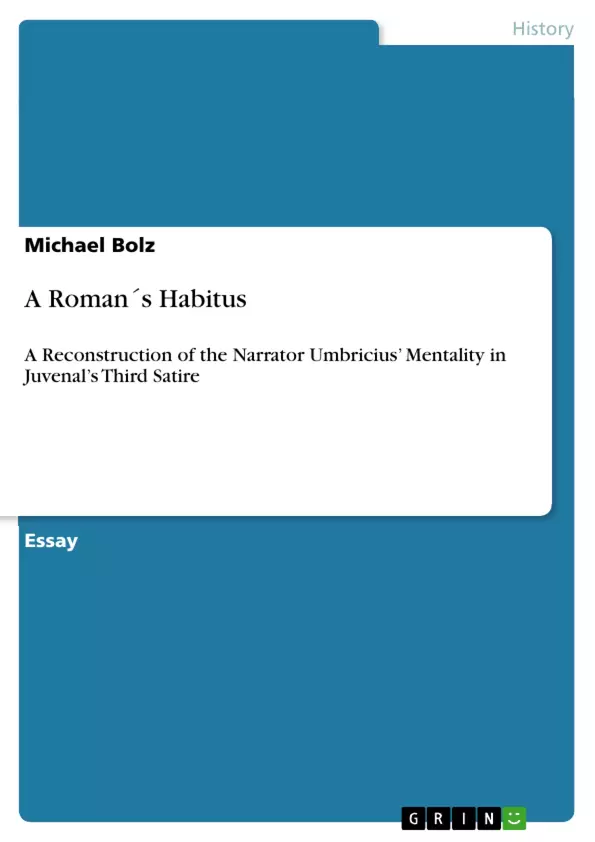Juvenal, Rom, Römer, Habitus, Satire, Geschichte, alte Geschichte, Erinnerung, Gedächtnis, sozialer Raum
Inhaltsverzeichnis (Table of Contents)
- Umbricius - Juvenal's alter ego:
- What I see, is...
Zielsetzung und Themenschwerpunkte (Objectives and Key Themes)
This essay aims to reconstruct the mentality of Juvenal, the author of the third satire, by analyzing the thoughts and observations of his alter-ego, Umbricius. Through this analysis, the author seeks to understand the Roman habitus, the way Romans behaved and perceived their world, as reflected in Juvenal's work.
- The impact of Greek culture on Roman society and the resulting transformation of Roman habitus.
- The changing social and economic landscape of Rome, including the rise of a pseudo-Greek culture and the decline of traditional Roman values.
- The nature of honest work in a society that has become increasingly dependent on imports and war.
- The conflict between traditional Roman values and the emerging Greek influences, leading to a cultural hermaphroditism.
- The use of satire as a tool for social commentary and self-reflection.
Zusammenfassung der Kapitel (Chapter Summaries)
- Umbricius - Juvenal's alter ego: This chapter introduces Umbricius, Juvenal's alter-ego, and his decision to leave Rome. The author argues that Umbricius' thoughts and observations provide insights into the mentality of a Roman living in the time of Juvenal. The chapter establishes the essay's goal: to reconstruct Juvenal's mentality by analyzing Umbricius' perspective. It also introduces the concept of habitus, which will be central to the analysis.
- What I see, is...: This chapter focuses on Umbricius' reasons for leaving Rome. The author analyzes Umbricius' words, highlighting key elements such as the decline of honest work, the rising cost of living, and the pressure to conform to a changing cultural landscape. The chapter examines the influence of Greek culture on Roman society and its impact on Roman habitus. It also explores the paradox of the Romans' attempt to integrate Greek culture, which ultimately leads to a transformation into a pseudo-Greek culture.
Schlüsselwörter (Keywords)
Key terms and concepts explored in this work include Roman habitus, Greek culture, cultural transformation, social and economic decline, satire, pseudo-Greek culture, hermaphroditism, honest work, imports, and war.
Frequently Asked Questions
Who is Umbricius in Juvenal's work?
Umbricius is the alter-ego of Juvenal in the third satire, whose thoughts and observations are used to reconstruct the mentality and "habitus" of a Roman.
What does the term "Roman habitus" refer to?
It refers to the way Romans behaved, perceived their world, and their underlying mentality as reflected in social and cultural norms.
How did Greek culture influence Roman society?
The rise of a pseudo-Greek culture led to a transformation of traditional Roman values, creating what the author calls "cultural hermaphroditism."
Why does Umbricius decide to leave Rome?
Reasons include the decline of honest work, the rising cost of living, and the pressure to conform to a changing, Greek-influenced cultural landscape.
What role does satire play in this analysis?
Satire is analyzed as a tool for social commentary and self-reflection, allowing Juvenal to criticize the social and economic decline of Rome.
- Citation du texte
- Michael Bolz (Auteur), 2010, A Roman´s Habitus, Munich, GRIN Verlag, https://www.grin.com/document/154932



